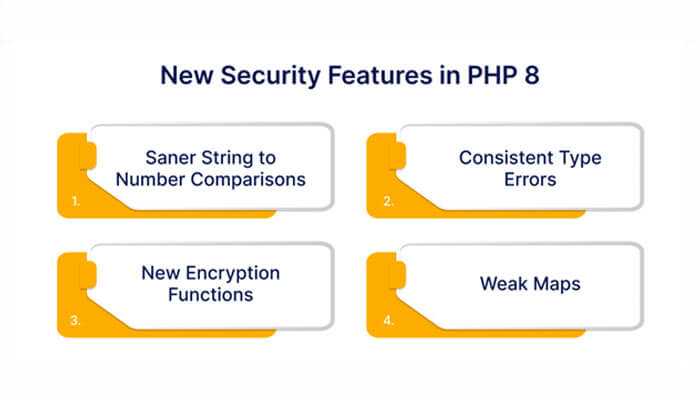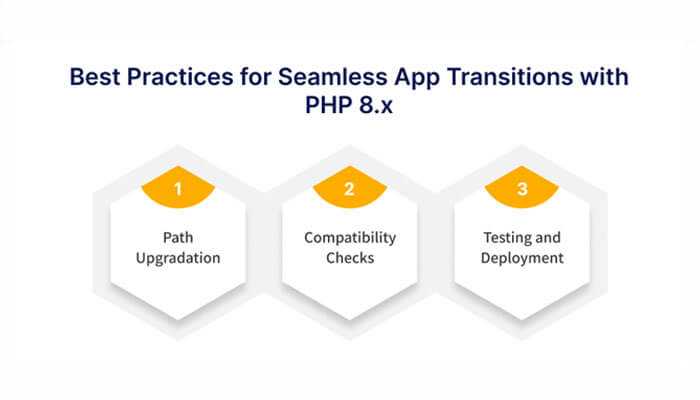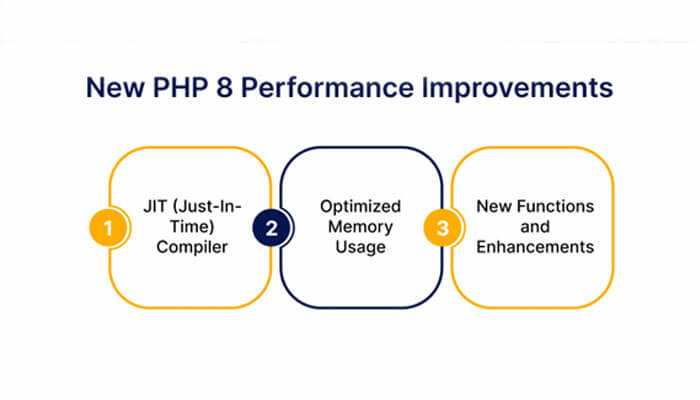PHP 8.x has long been the backbone of dynamic web development, powering nearly 80% of websites with its robust, server-side scripting capabilities.
From humble beginnings as a simple website creation tool, PHP has evolved into a critical component of complex, enterprise-level applications. With the release of PHP 8.x, this ever-popular language has reached new heights.
It offers substantial PHP 8 performance improvements and security features. This blog post will help you understand the cutting-edge features of PHP 8.x and how they can elevate your business applications for greater efficiency.
An Overview of PHP 8.x
The PHP 8.x series represents a significant milestone in the evolution of PHP, bringing new updates for modern web development.
Since the initial release of PHP 8.0, followed by subsequent updates like PHP 8.1 and 8.2, this series has introduced powerful features designed to enhance the performance, security, and overall efficiency of applications.
The transition from PHP 7.x to PHP 8.x is not just about incremental improvements. Still, it marks a bold step forward with significant changes like the Just-In-Time (JIT) compiler, union types, and improved error handling.
The primary goals behind PHP 8.x development focus on performance, security, and developer productivity. Meanwhile, PHP 8 performance improvements aimed at developer productivity, like named arguments and attributes, streamline coding and reduce bugs.
PHP 8 performance improvements/enhancements alone can translate into better user experiences and lower server costs. At the same time, the security improvements ensure that applications are better equipped to handle today’s increasingly sophisticated cyber threats.
Moreover, PHP 8.x is designed to empower developers and businesses alike to build robust, future-proof applications that meet the demands of an ever-evolving digital landscape.
Key PHP 8.x Performance Improvements
Have a look at the important PHP 8 performance improvements for enhancing business applications:
1. JIT (Just-In-Time) Compiler
JIT works by compiling parts of the code at runtime rather than interpreting it line by line, which drastically reduces execution time.
JIT translates PHP code into machine code on the fly, allowing it to be executed directly by the CPU. This accelerates computationally intensive tasks’ performance and brings PHP closer to the execution speed of low-level languages like C.
For business applications, this supports faster execution of PHP scripts, which directly translates to improved response times and enhanced user experiences. The JIT compiler also optimizes resource management, making it particularly beneficial for high-traffic applications.
2. Optimized Memory Usage with PHP 8.x
With more efficient memory management techniques, PHP 8.x reduces applications’ memory footprint, which is especially advantageous for high-traffic websites and resource-intensive applications.
These optimizations include more effective garbage collection and reduced overhead for specific data structures.
For business applications, servers can handle more concurrent users and processes without a decline in performance for optimized memory usage. This is crucial for maintaining the speed and reliability of applications during peak traffic periods.
3. New Functions and Enhancements
Functions like str_contains, str_starts_with, and str_ends_with are syntactically simpler and optimized for performance. These new string-handling functions make it easier and faster for developers to perform everyday tasks.
In practical terms, these functions reduce the need for complex and slower regular expressions, streamlining code and boosting execution speed.
For example, using str_contains can significantly enhance the performance of string operations in data parsing, search features, or input validation processes within business applications.
Pro Tip: You must hire experts from a reliable PHP web development company to deploy these features in your next PHP application.
Security Enhancements in PHP 8.x
Have a look at the key security features in PHP 8.x and their significance for enhancing business applications’ performance and security:

1. Saner String to Number Comparisons
PHP 8.x introduces stricter type handling in comparisons, particularly between strings and numbers.
This change reduces vulnerabilities caused by unexpected type coercion, where data types are automatically converted in a way that can lead to unintended or insecure behavior.
By enforcing stricter rules, PHP 8.x ensures comparisons are more predictable and secure, minimizing the risk of logic errors or security flaws in your application.
2. Consistent Type Errors
PHP 8.x improves error handling by providing consistent and clear type-related errors.
These enhancements lead to more predictable behavior, making it easier for developers to spot and fix bugs early in development.
Improved type consistency also reduces the likelihood of security issues arising from type mismatches, contributing to your application’s overall robustness and security.
3. New Encryption Functions
PHP 8.x introduces new and improved encryption and decryption functions, designed to offer more secure ways to handle sensitive data.
These functions enhance the security of business applications by providing more reliable methods for encrypting data, such as user credentials, financial information, and other confidential data.
This is crucial for protecting sensitive information from unauthorized access and ensuring compliance with data protection regulations.
4. Weak Maps
Weak maps in PHP 8.x allow developers to manage memory more efficiently by holding references to objects without preventing them from being garbage collected.
Hire PHP developers who can optimize memory usage in their applications, improving performance, especially in long-running processes by using weak maps.
Additionally, better memory management reduces the risk of memory-related vulnerabilities, such as memory leaks or buffer overflows, which attackers can exploit to compromise an application’s security.
New Features and Syntax Improvements in PHP 8.x
Have a look at the new features and syntax improvements in PHP 8 performance improvements:
1. Attributes (Annotations)
PHP 8.x introduces attributes, also known as annotations, which provide a new way to add metadata to classes, methods, functions, and other PHP elements.
This feature simplifies code by allowing developers to use structured metadata directly within the code, rather than relying on cumbersome PHPDoc comments or external configuration files.
Attributes enhance code readability and make it easier to manage repetitive tasks, such as validation rules, authorization checks, or ORM mappings.
For example, attributes can replace lengthy annotations in PHPDoc, making the codebase cleaner and more organized. This improves readability and reduces the amount of boilerplate code, making maintenance much easier.
2. Union Types
Union types are another significant addition in PHP 8.x, providing the ability to declare that a variable or function parameter can be of multiple types.
For example, developers from a PHP development company can now define a parameter that accepts both int and float types with a simple union type declaration (int|float) instead of creating complex logic to handle different types. This feature increases the flexibility of code and improves type safety.
By clearly defining the acceptable types, developers can prevent unexpected behaviors and bugs, leading to more robust applications. This translates to fewer errors, smoother user experiences, and more maintainable codebases for business applications.
3. Named Arguments
Named arguments allow developers to pass arguments to functions based on parameter names rather than their positions. This enhancement improves code clarity, especially in functions with many optional parameters.
Named arguments clarify which values are assigned to which parameters, reducing the chances of errors and making the code more self-explanatory.
For example, in a function call with multiple optional parameters, using named arguments allows developers to specify only the parameters they need without worrying about their order. This improves readability and simplifies the process of adjusting function calls.
How to Enhance Developer Productivity?
This is how PHP 8 performance improvements allow developer productivity through better error handling and improved tooling, thus, making it a valuable upgrade for business applications.
Error Handling Improvements
PHP 8.x introduces new error-handling mechanisms, including using throw expressions in any context where an expression is allowed. This flexibility allows for more concise and readable code when handling exceptions.
These improvements streamline debugging by providing more precise and more consistent error diagnostics. Developers can quickly identify and resolve issues, leading to a more efficient development workflow and reducing the time spent troubleshooting and fixing bugs.
PHP 8.x Tooling
PHP 8. x updates the ecosystem of tools that support the development process, including IDE integrations, testing frameworks, and static analyzers. These tools have been optimized for compatibility with the new features and syntax introduced in PHP 8.x.
The availability of these updated tools makes upgrading to PHP 8.x easier, as they help ensure that existing codebases remain compatible with the latest version.
Additionally, the enhanced tooling improves the overall development workflow, allowing developers to take full advantage of PHP 8.x’s features while maintaining high code quality and productivity standards.
How Can You upgrade to PHP 8.x for Smooth PHP Apps?
Have a look at the best practices for upgrading to PHP 8.x and ensuring a smooth and efficient transition for business applications.

1. Path Upgradation
Here is a step-by-step guide and some considerations to follow for upgrading to PHP8:
• Start by reviewing the official PHP 8.x migration guide to understand the new features, changes, and deprecated functions.
• Plan your upgrade by creating a development environment that mirrors your production setup.
• Upgrade non-critical applications or components to PHP 8.x to test for potential issues.
• Prioritize upgrading libraries, frameworks, and dependencies to ensure they are compatible with PHP 8.x.
• Update your development tools, such as IDEs and code linters, to versions that support PHP 8.x using PHP development Services.
2. Compatibility Checks
Have a look at the tips on checking for compatibility issues and how you can address deprecated features:
• Conduct a thorough codebase audit to identify deprecated features or syntax changes.
• Use static analysis tools like PHPStan or Psalm to detect potential compatibility issues.
• Look for direct or indirect dependencies that may not be fully compatible with PHP 8.x, and update or replace them as needed.
• Refactor or replace deprecated functions and practices with recommended alternatives.
• Update your code to use newer, more secure, and efficient features introduced in PHP 8.x, ensuring that your application remains modern and maintainable.
3. Testing and Deployment
Here’s what you can do to ensure a smooth transition and deployment:
• Before deploying PHP 8.x to your production environment, implement comprehensive testing strategies. This includes unit integration and performance testing to catch bugs or regressions.
• Automate your testing processes using PHP web development services to ensure consistency and speed up the feedback loop.
• Gradually upgrade in a staged environment, starting with non-critical systems.
• Monitor the performance and stability of your application closely during and after deployment.
• Have a rollback plan in case any issues arise. This will allow you to revert to the previous PHP version without disrupting your business operations.
Conclusion
As businesses strive to deliver faster, more secure digital experiences, adopting PHP 8.x emerges as a strategic move.
PHP 8 performance improvements and security features not only future-proof your applications but also provide a competitive edge in a rapidly evolving market.
Using the power of PHP 8.x and PHP web development trends, you can upgrade your tech stack and invest in your business’s reliability and success.
This is the right time to elevate your business applications, so partner with top PHP web app development companies to unlock their full potential.



